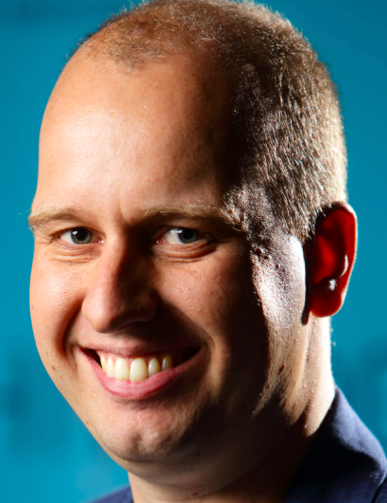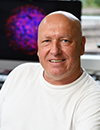Andries D. van der MeerAssociate Professor, Scientific lead, Organ-on-Chip Center Twente, University of Twente Dr. Andries D. van der Meer is Associate Professor at the Faculty of Science and Technology of the University of Twente, The Netherlands. He is leader of the research theme ‘Organs-on-Chips’ in the Applied Stem Cell Technologies group of the Bioengineering Technologies cluster, supervising five Ph.D. candidates and coordinating multiple research projects on the development of blood vessels-on-chips as well as their integration in full organ-on-chip systems like the retina-on-chip, lung-on-chip and heart-on-chip. |
Peter ErtlProfessor of Lab-on-a-Chip Systems, Vienna University of Technology Prof. Ertl holds an engineering degree in Biotechnology (University of Life Sciences, BOKU, Austria), a PhD in Chemistry (University of Waterloo, UW, Canada) and received his postdoctoral training as a biophysicist at University of California at Berkeley (UCB, US). Following a position as Director of Product Development at a UW spin-off venture (Canada), Dr. Ertl joint the Biosensor Technology unit at the Austrian Institute of Technology (AIT). During his tenure at the AIT, Dr. Ertl was also granted a Fulbright Visiting Scholarship at UC Berkeley (2012) and conducted visiting scientist positions at Nanyang Technological University, Singapore (2013), the Medical Center of the University of California at San Francisco (2014). In 2016 he was appointed Professor of Lab-on-a-Chip Systems for Bioscience Technologies at the Vienna University of Technology (TUW), where his research focuses on the development of advanced in vitro diagnostic microsystems and organ-on-a-chip systems. Additionally, Dr Ertl held a visiting research appointment at Imperial College London (UK) in 2019 , is speaker of the Austrian Microfluidics Initiative (AMI) and editor of the open access journal Organs-on-a-Chip (Elsevier). |
Thomas HartungProfessor and Doerenkamp-Zbinden Chair for Evidence-based Toxicology, Director of the Center for Alternatives to Animal Testing (CAAT), Johns Hopkins Bloomberg School of Public Health Thomas Hartung, MD PhD, is the Doerenkamp-Zbinden-Chair for Evidence-based Toxicology in the Department of Environmental Health and Engineering at Johns Hopkins Bloomberg School of Public Health, Baltimore, with a joint appointment at the Whiting School of Engineering. He also holds a joint appointment for Molecular Microbiology and Immunology at the Bloomberg School. He is adjunct affiliate professor at Georgetown University, Washington D.C.. In addition, he holds a joint appointment as Professor for Pharmacology and Toxicology at University of Konstanz, Germany; he also is Director of Centers for Alternatives to Animal Testing (CAAT, http://caat.jhsph.edu) of both universities. CAAT hosts the secretariat of the Evidence-based Toxicology Collaboration (http://www.ebtox.org), the Good Read-Across Practice Collaboration, the Good Cell Culture Practice Collaboration, the Green Toxicology Collaboration and the Industry Refinement Working Group. As PI, he headed the Human Toxome project funded as an NIH Transformative Research Grant. He is Chief Editor of Frontiers in Artificial Intelligence. He is Consulting Vice-President of AxoSim Inc., New Orleans. He is the former Head of the European Commission’s Center for the Validation of Alternative Methods (ECVAM), Ispra, Italy, and has authored more than 585 scientific publications. |
Roger KammCecil and Ida Green Distinguished Professor of Biological and Mechanical Engineering, Massachusetts Institute of Technology (MIT) Kamm is currently the Cecil and Ida Green Distinguished Professor of Biological and Mechanical Engineering at MIT, where he has served on the faculty since 1978. Kamm has long been instrumental in developing research activities at the interface of biology and mechanics, formerly in cell and molecular mechanics, and now in engineered living systems. Current interests are in developing models of healthy and diseased organ function using microfluidic technologies, with a focus on vascularization. Kamm has fostered biomechanics as Chair of the US National Committee on Biomechanics (2006-2009) and of the World Council on Biomechanics (2006-2010). Kamm currently directs the NSF Science and Technology Center on Emergent Behaviors of Integrated Cellular Systems. He is the 2010 recipient of the ASME Lissner Medal (American Society of Mechanical Engineering) and the 2015 recipient of the Huiskes Medal (European Society of Biomechanics), both for lifetime achievements, and is the inaugural recipient of the ASME Nerem Medal for mentoring and education. He was elected to the National Academy of Medicine in 2010. Kamm is co-founder of two companies, Cardiovascular Technologies and AIM Biotech, a manufacturer of microfluidic systems for 3D culture. |
Séverine Le GacProfessor, Applied Microfluidics for Bioengineering Research, MESA+ Institute for Nanotechnology, University of Twente Séverine Le Gac is Professor at the University of Twente, The Netherlands, where she leads a team called “Applied Microfluidics for BioEngineering Research – AMBER”. Séverine Le Gac received her Engineer degree in chemistry (specialization biology) from the ESPCI (Paris, France) in 2000 and her PhD cum laude in 2004 in life sciences from the University of Lille (France). She has about 20 years experience in the field of microfluidics focusing on bioanalytical, biological and medical applications. Her research interests focus on the use of microfluidic devices and organ-on-chip models for biological and medical applications, including experimentation on single cells, analysis of extracellular vesicles, cancer research, assisted reproductive technologies, and the incorporation of biomechanical cues in organ-on-chip models. Prof. Le Gac is Associate Editor of the Lab on a chip journal (RSC), co-editor-in-chief of the Organs-on-a-chip journal (Elsevier) and part of the advisory board of the Journal of Micromechanics and Microengineering (IOP Publisher). Since 2018, she has also been Member of the Director Board of the CBMS Society (Chemical and Biological Microsystem Society; https://cbmsociety.org/), of which she is currently the vice-president. |




